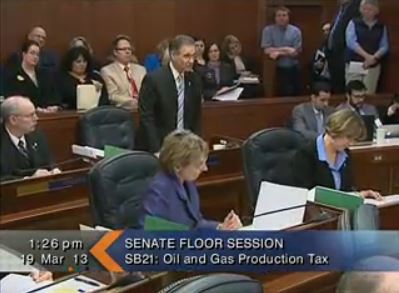
Legislation that would overhaul the state’s oil tax system landed on the Alaska Senate floor Tuesday.
The current version raises the base tax rate while giving companies a credit for every barrel produced. But it also gets rid of a mechanism that raises taxes when oil prices are high. The overall effect is to bring down taxes on oil companies with the goal of spurring production.
While there wasn’t a formal debate on the bill, the small Democratic minority took advantage of a procedural motion to get answers on what the changes would do to the state treasury. It took an hour before the Senate even decided to swap out Governor Sean Parnell’s original proposal for a version that legislators had revised over the course of weeks.
Most of the time, adopting a committee substitute is a simple matter of process. But Democrats used the move to pepper the majority with questions about how the bill worked and what the ultimate fiscal impact would be.
It started after Senators Kevin Meyer and Peter Micciche, Republicans who work for ConocoPhillips, offered to recuse themselves from voting because a perceived conflict of interest. After they were overruled, Senator Johnny Ellis of Anchorage, asked something basic about how different versions of the bill compared to each other.
Then, Senator Hollis French – also of Anchorage – asked about a provision that would lower the base tax rate by two percent after 2016. French wanted to know whether that cut was automatic or was tied to production. Senator Meyer, who co-chairs the Finance Committee, explained that the “bill should have the impact of encouraging more oil production.” French wasn’t satisfied with the answer.
“I didn’t hear what part of the bill does that,” he said. “Is there a section in the bill that does that or is there simply a wish and a hope that they’ll do as we ask?”
Minority members asked question after question about how tax credits for new oil in old fields would work, how a credit to companies who manufacture equipment used for oil production would be applied, and so on.
After almost every question, Senate President Charlie Huggins, a Wasilla Republican, would rap his gavel for an at-ease so those carrying the bill could get answers from aides and administration staff. There were nearly a dozen breaks in total.
At times, Democrats’ questions went beyond the bill’s mechanics and bordered on political statements. Without the numbers or political clout to get their own oil tax bill through the legislature, the minority has been on an aggressive public relations campaign to drum up opposition to the bill, which they argue will cost the state billions in lost revenue.
Senator Bill Wielechowski of Anchorage has been an especially vocal critic of bringing down oil taxes, and he expressed concern that the bill under consideration wouldn’t generate enough revenue for the state when oil prices are low.
“What are we doing in this bill to protect Alaskans at the low end?” Wielechowski asked. “What’s the difference between the resources version and the finance version? I want to know a number. I want to know how much more, less, or the same this is compared to ACES and compared to the resources version. If I can’t get an answer, say I can’t get an answer. Say ‘I don’t know.'”
Amendments on the bill will be offered Wednesday, and members of both the minority and majority are expected to offer changes. A vote could come during the same session. If it passes, the bill will then go on to the House for consideration.
